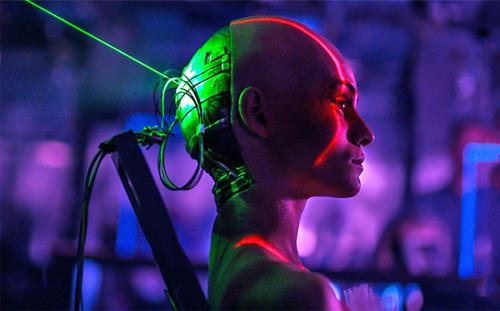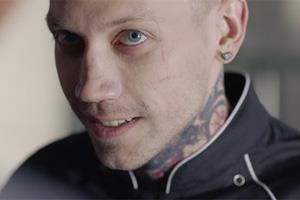
Error 404. It’s the software update that gets you every time.
It was a bad software update that touched off the anarchy and mayhem in Westworld, in the very first episode, and it’s a software update — interrupted in mid-upload — that causes no end of panic for the evildoers at the all-seeing high-tech firm Cronos in Better Than Us, the dystopian Russian sci-fi thriller that premiered this past week on Netflix.
Better Than Us is part thriller, part cautionary sci-fi screed about rapacious corporations and broken personal relationships in a futuristic world where androids do all the work, from menial household chores to providing companionship for lonely hearts. It’s a mash-up of any number of sci-fi tropes familiar to viewers and moviegoers here, from A.I.and I, Robot to Ex Machina, Westworld and, perhaps most interestingly, V for Vendetta.
It’s also very Russian.
 One of Netflix’s more notable talking points is the treasure trove of TV from other countries and other cultures that are presented, matter-of-factly and with no advance publicity in a lot of cases, alongside more familiar homegrown fare like Mindhunters, Stranger Things, and The Crown.
One of Netflix’s more notable talking points is the treasure trove of TV from other countries and other cultures that are presented, matter-of-factly and with no advance publicity in a lot of cases, alongside more familiar homegrown fare like Mindhunters, Stranger Things, and The Crown.
Russia, for all its prominence in the mainstream news cycle, is a virtual unknown — pun intended! — when it comes to its TV and movies. To TV viewers here, Russia is a mystery, despite its proximity to Scandinavia, which gave us such Nordic noir classics as The Girl with the Dragon Tattoo, Wallander, the original The Killing (Forbrydelsen) and the original The Bridge(Bron).
Russia is different, of course, and yet the same.
Netflix was behind the stylish, if disturbing, Russian serial killer drama The Method last year, and it showed day-to-day life in modern-day Russia in a way you rarely see on the news: Ordinary, everyday people just trying to get by in the city, with middle-class dreams, middle-class jobs, and middle-class worries. Sweden, if you will, with the same gloomy skies and long, long winters, but a more authoritarian government.
 Better Than Us is set in an unnamed Russian city in the not-too-distant future, where androids have been designed to make people’s lives easier. An ambitious tycoon with a failing marriage and a wealthy, all-powerful father-in-law who holds him in utter contempt, has backed a new android that will revolutionize — pun intended! — everything from love and sex to motherhood and, um, politics.
Better Than Us is set in an unnamed Russian city in the not-too-distant future, where androids have been designed to make people’s lives easier. An ambitious tycoon with a failing marriage and a wealthy, all-powerful father-in-law who holds him in utter contempt, has backed a new android that will revolutionize — pun intended! — everything from love and sex to motherhood and, um, politics.
There’s just one catch. The prototype, mere hours before it’s to be presented before Politburo decision-makers and that bad-tempered father-in-law who says this overpriced project had better work or else his son-in-law can start looking for a new job, and a new wife, gets loose in the streets and turns rogue. This rogue android is no Arnold Schwarzenegger in full Terminator gear, either; it looks more like Russian supermodel Tatiana Sorokko, but with the strength of a Marvel superhero. The rogue android, Arisa, has been programmed to glom onto the first person it imprints as its primary handler, and in this case that turns out to be the six-year-old daughter of a one-time star surgeon who lost his job owing to a botched operation — everything is connected, and everything is explained eventually — and is now making ends meet as a forensic pathologist in the local morgue. Complications ensue!
Complications are further complicated when the surgeon’s adolescentson falls in with an underground resistance movement called The Liquidators, a kind of Hong Kong-inspired protest group who run around the streets at night in balaclavas, stringing up any androids they can find, because androids are not right, you see, and represent the end of a free-thinking society. Think Westworld meets V for Vendetta.
Of course, when an android is designed to be as sophisticated as Arisa is, all bets are off. And when the software update goes haywire… Well…
Russian TV lacks the sophisticated wiring of slick, big-budget HBO productions like Westworld and, erm, Chernobyl, and the ideas aren’t as layered or meaningful as anything in The Leftovers.
 Better Than Us is fascinating to watch, though, just the same. It manages to be cautionary without being portentous — not an easy line to walk — and it’s fun without being silly. It doesn’t take itself too seriously, and that’s somewhat of a relief. Westworld can take itself seriously — very seriously — because it’s one of the most nuanced, deeply textured, keenly plotted dramas on the small screen today.
Better Than Us is fascinating to watch, though, just the same. It manages to be cautionary without being portentous — not an easy line to walk — and it’s fun without being silly. It doesn’t take itself too seriously, and that’s somewhat of a relief. Westworld can take itself seriously — very seriously — because it’s one of the most nuanced, deeply textured, keenly plotted dramas on the small screen today.
Better Than Us doesn’t labor under any such pretensions. It’s entertainment – through-and-through – while asking some interesting questions about whether an artificial creation really can be better than us.
These days, that’s enough. Better Than Us is a welcome, refreshing diversion, and the Russian setting gives it added appeal. If you’ve been hankering to see a new drama featuring Kirill Käro, Paulina Andreeva and Kirill Polukhin — terrific as the unshaven, world-weary police detective who’s seen it all before and knows that everyone is playing him for a mug — this is the show for you.